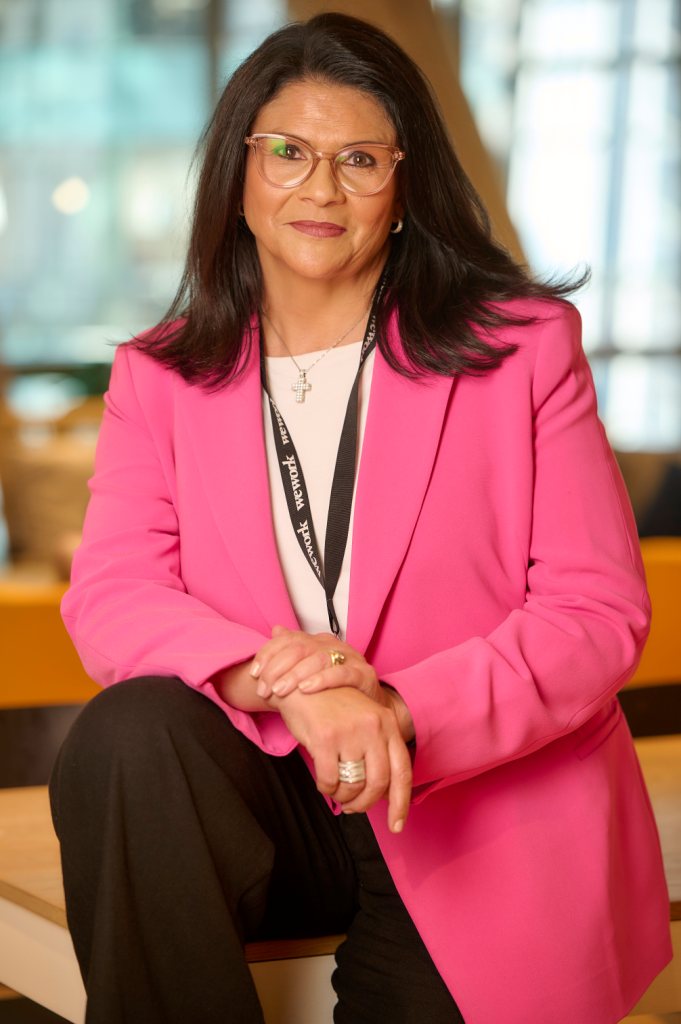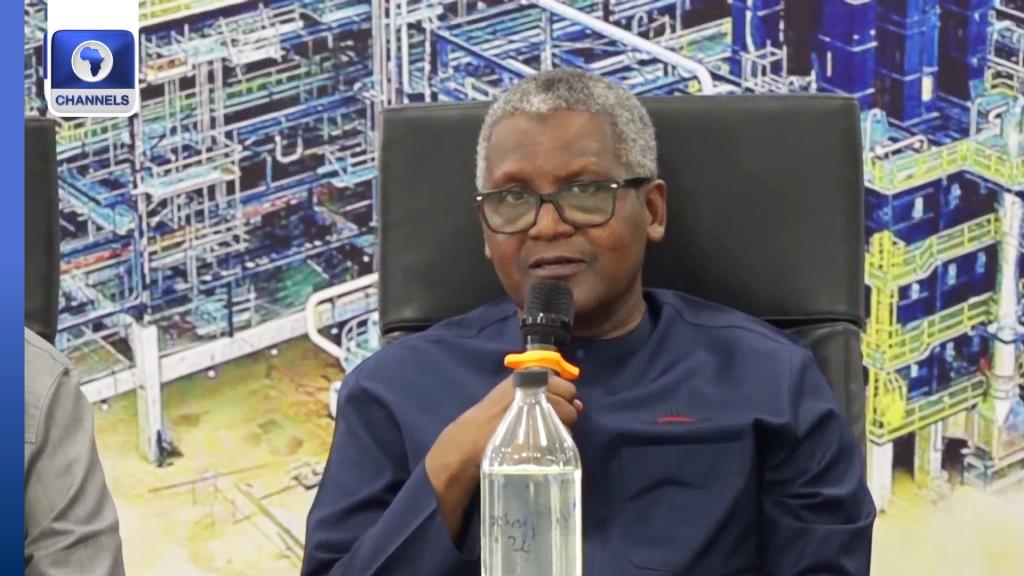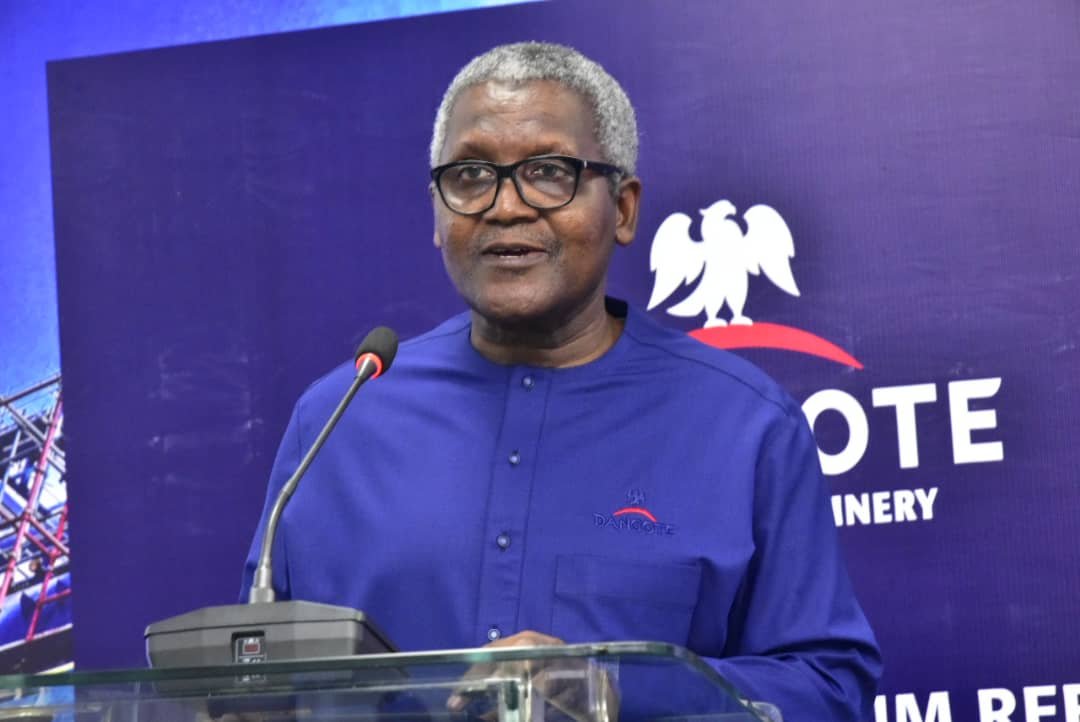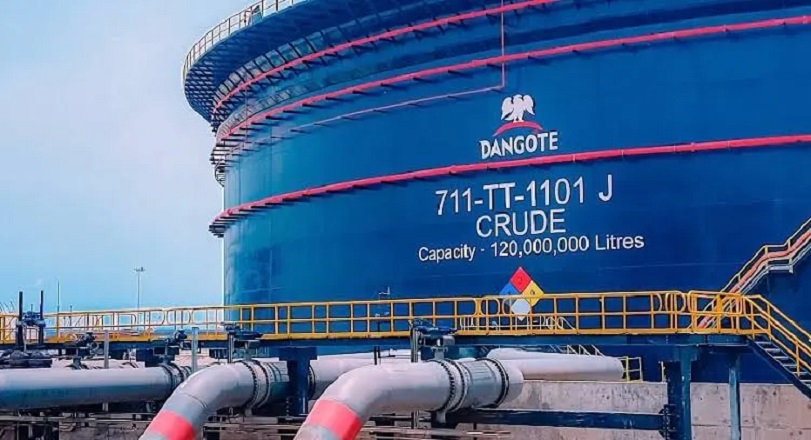Feature/OPED
Dangote Refinery, Industrialization and Lessons Africans Must Learn

By Jerome-Mario Chijioke Utomi
On Monday, May 22, 2023, policymakers and captains of industries from across the world converged on the Lekki axis of Lagos State for the commissioning of the world’s largest single-train 650,000 barrels-per-day petroleum refinery built by Dangote Group. Going by commentaries, the refinery, when it becomes fully operational, will give a boost to efforts by the federal government to make Nigeria self-sufficient in local refining of crude oil and save the scarce foreign exchange used in the importation of petroleum products.
Again, aside from the expert reports that the refinery can meet 100 per cent of the country’s requirement of all refined products: gasoline, 53 million litres per day; diesel, 34 million litres per day; kerosene, 10 million litres per day, and aviation jet, 2 million litres per day, with a surplus of each of these products for export, also heartening is the awareness that the refinery is ‘laced’ with the 435 MW power plant that can also meet the total power requirement of Ibadan DisCo of 860,316 MWh, covering five states, including Oyo, Ogun, Osun, Kwara, and Ekiti.
While this huge feat by Aliko Dangote and his group is being celebrated, the development, on the other hand, elicits two separate but related reactions.
Foremost, it calls on Africans that it is time to recover their moral and strategic ‘health’ to stand again for freedom, demand accountability from their leaders for poor decisions, missed judgment, lack of planning, lack of preparation and wilful denial of the obvious truth about serious and imminent threats that are facing Africans. Dangote’s current milestone is a testament that the time is ripe for Africans to reject the false and horrendous reasons being offered to them by their leaders as an explanation for why the continent is not yet industrialized or developed.
Dangote is not a public office holder on the continent but his latest feat demonstrates a man with an understanding that considering the slow-growing economy but scary unemployment levels in the continent, the only way to survive was to industrialize-that Africa as a continent will continue to find itself faced with difficulty accelerating the economic life cycle of its people until their leaders contemplate industrialization, or productive collaboration with private organizations that have surplus capital to create employment.
Take as another illustration, I noted in one of my previous interventions that one of the popular demands during the fuel subsidy removal protest in January 2012, under President Goodluck Ebele Jonathan’s administration in Nigeria, was that the federal government should take measures to strengthen corporate governance in the Nigerian National Petroleum Company (NNPC) as well as in the oil and gas sector as a whole. This is because of the belief that weak structures made it possible for endemic corruption in the management of both the downstream and upstream sectors of the oil and gas industry.
On his part, President Muhammadu in 2015 promised Nigerians a fair deal. But for eight years, the three government-owned refineries in the country have not been able to function at full capacity as promised by the present administration for a myriad of reasons that revolve around corruption.
Today, if there is anything that Nigerians wish that the FG should accomplish quickly, it is getting the refineries to function optimally as well as make the NNPC more accountable to the people. What happened under President Jonathan has become child’s play when compared with the present happenings in Nigeria’s oil/gas and electricity sectors.
Broadly speaking, it is not by any standard a good commentary that after over 60 years of independence, African countries continually look up to other continents for aid. This covertly tells a story of a continent lacking in the capacity to take responsibility for its actions and initiatives for values.
As an illustration, the Chinese development aid to Africa, going by reports, totalled 47% of its total foreign assistance in 2009 alone, and from 2000 to 2012, it funded 1,666 official assistance projects in 51 African countries.
Also, rings of apprehension are the awareness that Africa is the most populated in the world with over 1.2 billion people, but sadly represents only 1.4% of the world manufacturing value added in the first quarter of 2020. This is further exacerbated by the fact that out of over 51 countries in Africa as a continent, only South Africa qualified as a member of BRICS, an acronym coined for an association of five major emerging national economies: Brazil, Russia, India, China and South Africa.
This piece is not alone on the economic and industrial backwardness of Africa as a continent. A book entitled: Technology and Wealth of Nations, in like manner, chronicled the slanted and unsustainable effort different African governments made in the past to bring their nations out of the technological woods, as well as outlined the way forward.
Separate from thoughtfully and masterfully examining the inspirable relationship between technological development and the economic progress of nations, the book deftly argues with facts that the point of the sail of all economies is the introduction of the manufacturing sector or the industrial economy. The author establishes that Africa’s prolonged economic plight is centred on the two fundamental challenges of a manufacturing economy.
It traces Africa’s economic backwardness to its roots – a key problem that has kept our policymakers handicapped and our economies crippled. With documented facts on the crippling institutionalized policies and organized sequences of stagnating events of the colonial masters, the author asks: “Why is it that Europe, which hosted the industrial revolutions in the 17th and 18th centuries, did not permit technological education in Africa in about 50 years of colonization, and prefers to send aids afterwards?”
Of course, the above question, in my view, may not be lacking in merit considering the fact that Africa presently is dotted with projects built with aid from Europe, the United States of America (USA) and lately, China.
Whatever the true situation may be, I believe and still believe that there exists something troubling technologically that characterizes Africa more as a dark continent.
On the way out of the continent’s technological debacle and the current wealth disparity among nations (industrial economies), experts believe that the current wealth disparity among nations (industrial economies) represented by highly industrialized Europe, North America and Japan on the one hand and most developing (non-industrial economies) countries, in particular, those in sub-Saharan Africa, on order is primarily the difference in the technical capability and capacity to produce and manufacture modern technologies and to use the technologies to produce and manufacture globally competitive industrial goods and to sustain the commanding tasks of science and technology in the economy.
The disparity, it added, has since considerably widened and will continue to widen as long as the developing countries depend almost totally on industrial nations for the technologies and industrial inputs they need to sustain their economies.
Consequently, the only way to bridge the wealth gap is for the developing countries of the world to build their domestic endogenous capabilities and capacities to produce modern technologies and competitive industrial goods in their own economies, he concluded.
Catalysing the process will again necessitate African leaders borrowing bodies from Asian tigers in order to raise Africa’s industrial soul.
Above all, this piece holds the opinion that African leaders must, at the present moment of our existence, recognize clearly that; public order, personal and national security, economic and social programmes, and prosperity are not the natural order of things but depends on the ceaseless efforts and attentions from an honest and effective government that the people elect. They must collectively recognize also that it takes a prolonged effort to administer a country well and change the backward habits of the people.
Utomi is the Program Coordinator (Media and Policy) at Social and Economic Justice Advocacy (SEJA), Lagos. He can be reached via;jeromeutomi@yahoo.com or 08032725374
Feature/OPED
Artificial Intelligence: The Indispensable Catalyst for Nigeria’s Agricultural Revolution

By Diana Tenebe
Nigeria’s agricultural sector, a cornerstone of its economy, faces a critical crossroads. While employing a staggering 40% of the population and holding over 84 million hectares of arable land, the industry is hobbled by deep-seated challenges. Low productivity, a fragmented supply chain, poor infrastructure, and a lack of access to financial services are just a few of the hurdles that prevent the sector from reaching its full potential. Coupled with the unpredictable and severe shocks of climate change—from prolonged droughts to devastating floods—these issues threaten the food security of a rapidly growing population.
To truly transform this vital sector, a new approach is needed, one that moves beyond traditional methods and embraces the power of technology. Artificial Intelligence (AI) is not just a futuristic buzzword; it is the imperative for Nigeria’s agricultural revolution. AI holds the key to unlocking higher yields, building resilience, and fostering an inclusive and sustainable food system that can feed a nation and drive economic growth.
The most immediate impact of AI is in the area of precision farming. By integrating AI with technologies like Internet of Things (IoT) sensors, drones, and satellite imagery, farmers can gain an unprecedented understanding of their land. AI-powered systems can analyse real-time data on soil moisture, nutrient levels, and plant health, providing actionable insights for targeted interventions. For instance, smart irrigation systems can optimize water usage, a critical resource in a country facing increasing water scarcity. AI-enabled drones can survey vast farmlands in minutes, identifying early signs of pests or disease and allowing for precise application of pesticides, reducing chemical use and cost. Early trials of these technologies in Nigeria have already demonstrated significant gains, with some reports showing a remarkable 60-70% increase in crop yields.
Climate adaptation is another area where AI’s role is indispensable. Nigeria’s farmers are on the front lines of climate change, enduring erratic rainfall and extreme weather events. AI can provide a shield against this volatility. By analyzing historical weather data and real-time forecasts, AI models can offer accurate, localized predictions. This allows farmers to proactively adjust their planting schedules, select climate-resilient crop varieties, and plan for potential risks, effectively mitigating the devastating impact of droughts and floods.
The economic benefits extend far beyond the farm gate. A significant portion of Nigeria’s agricultural produce is lost due to an inefficient and fragmented supply chain. AI can streamline logistics, optimize transportation routes, and enhance inventory management. By reducing spoilage and waste, AI ensures that more of what is harvested reaches the market, thereby boosting the incomes of farmers and providing a more stable supply of food for consumers. The success of Nigerian agritech companies like Crop2Cash, which has reportedly helped over 500,000 farmers increase their income by up to 70%, demonstrates the tangible economic impact of these technologies.
AI is a powerful tool for promoting financial inclusion and education. Millions of smallholder farmers, who form the backbone of Nigerian agriculture, are often excluded from formal financial systems due to a lack of collateral and credit history. AI-driven fintech solutions can bridge this gap by assessing creditworthiness using alternative data, making it easier for farmers to access the loans and insurance they need to scale their operations. AI-powered mobile apps and chatbots can also serve as virtual extension agents, providing personalized advice on best farming practices, pest control, and crop management, democratizing knowledge and empowering farmers to make better decisions.
Despite this immense potential, the journey towards widespread AI adoption is not without its hurdles. High upfront costs for AI-enabled equipment, a general lack of understanding and experience with these tools, and a preference for traditional methods are all significant barriers. Furthermore, infrastructural gaps, including poor roads and inadequate storage facilities, hinder the seamless implementation of these technologies. Data availability and computational capacity are also key challenges that need to be addressed.
However, the Nigerian government and a burgeoning ecosystem of agritech startups are already paving the way forward. The government’s vision is articulated in initiatives like the National AI Strategy, which aims to establish AI research centers and support R&D. Programs such as the Nigeria Artificial Intelligence Research Scheme (NAIRS) and the NITDA AI Developers Group are building the necessary skills among entrepreneurs and farmers. Strategic partnerships between government bodies, financial institutions, and innovative startups are creating localized solutions that are tailored to the unique conditions of Nigerian agriculture.
Ultimately, AI is not a luxury but an imperative for Nigeria to unlock its agricultural potential. Its successful integration will transform the role of the farmer from a manual laborer to a strategic planner and overseer of a smart, efficient, and sustainable food system.
By investing in infrastructure, fostering strategic partnerships, and prioritizing education and capacity building, Nigeria can harness the power of AI to feed its people, drive economic prosperity, and secure its place as a leader in the African agricultural revolution.
Diana Tenebe is the Chief Operating Officer of Foodstuff Store
Feature/OPED
Nigerian Women Achieve: Lessons in Real Support from the Super Falcons and MTN

When the Super Falcons pulled off their stunning comeback against Morocco to win the 2024 Women’s Africa Cup of Nations, it wasn’t just another title. It was a defining moment. Down by two goals and playing against the host country, the Nigerian women’s team fought back to clinch a 3–2 victory and claim their 10th WAFCON trophy. It was bold, brilliant and beautiful to watch.
But beyond football, something else stood out. In the days that followed, the Falcons shared a handwritten letter addressed to MTN Nigeria. It was signed by their captain, Rasheedat Ajibade, and spoke from the heart. The team acknowledged MTN’s support throughout the tournament, from their pre-match preparations to the warm welcome they received back home. It wasn’t just about appreciation. It was a reflection of what can happen when women are backed, seen and celebrated.

MTN has been the official telecommunications partner of the Nigerian Football Federation for years, and their involvement in football isn’t new. But their support of the women’s team this year was different. It was loud, visible and intentional. The Falcons were first received at the MTN Nigeria headquarters in Ikoyi, where staff lined the building, singing and cheering as the players arrived. The next day, MTN hosted a celebratory breakfast reception in Lagos where the company presented the team and coaching crew with a 150 million naira reward. Of that sum, 115 million went to the players and 35 million to the technical team.
What stood out even more than the money were the words shared by MTN’s CEO, Dr, Karl Toriola. He called the Super Falcons more than athletes. He called them inspirations. He spoke not only of MTN’s pride in their performance but also of the company’s broader commitment to women in leadership. According to Toriola, MTN Nigeria has already surpassed the 50-50 executive management gender representation goal set for 2030, and currently holds one of the most balanced leadership teams on the Nigerian Stock Exchange.
This alignment between external support and internal structure says a lot. MTN is not simply attaching its name to a moment. It is investing in systems that allow women to thrive, whether they’re on the football pitch or in the boardroom. That kind of support is rare, and it matters.
The Falcons clearly see it. In their letter, they described MTN’s role as more than a sponsorship. They acknowledged the power of visibility, of being shown that their achievements are worth celebrating. They also made it clear that this is just the beginning. The WAFCON win was historic, but their sights are set higher. They want to be global contenders, not just local champions.
That journey will require continued support, not just from the Federation or government, but from partners like MTN who understand that progress for women must be intentional and consistent. Backing women means showing up before the trophy is lifted, not just after.
Moments like these show us what is possible when women are supported to rise. And it is not just about football. It is about changing how young girls see themselves. It is about shifting how women are valued in every space. The Falcons said it best in their closing line to MTN: “Together, we’ll keep soaring.”
Feature/OPED
Humans + Machines: Building the Workforce of the Future

By Ursula Fear
Is AI coming for your job, or is it already working beside you? As its use becomes more routine, artificial intelligence is looking less like a threat and more like a teammate: answering queries, making decisions, chasing leads, processing invoices, and drafting content around the clock.
This new class of digital labour is changing how teams function, how targets are met, and how people spend their time at work. From now on, almost every job, team, and company will involve AI agents – systems that can analyse vast datasets, apply human-like reasoning, and act independently. Their presence is set to influence workflows, increase productivity, support innovation, and redefine roles across the organisation.
Rather than replacing people, AI is tilting the workload. Salesforce research shows that 23% of HR teams plan to redeploy employees into roles that make better use of their uniquely human strengths. At the same time, agentic AI adoption is projected to surge by 327% over the next two years (from roughly 15% adoption today to about 64% by 2027).
This shift is tied to anticipated productivity gains of 30% per employee and labour cost reductions of 19%, equating to about $11,000 in savings per employee annually, based on Organisation for Economic Co-operation and Development (OECD) wage averages. Rather than replacing people, organisations are preparing to reskill and redeploy workers, enabling humans to focus on higher-value roles that emphasise creativity, strategy, and interpersonal skills.
A recent Gartner poll further found that 95% of customer service teams intend to retain human agents to help define and guide the role of AI, reinforcing the value of a “digital first, not digital only” approach. Gartner further says that by 2027, half of the organisations that planned to significantly reduce their customer service workforce will abandon those plans, highlighting the limits of going fully “agentless”.
For African countries, the rise of digital labour presents an opportunity to build modern, inclusive workforces without being bound by outdated development models. But realising this potential depends on sustained investment in skills training, digital infrastructure, and equitable access to AI tools.
Train for tomorrow
Africa has the world’s youngest population. It’s bursting with entrepreneurial energy. But many young people still don’t have access to the tools and skills that will define the next era of work. If the continent wants to lead in the digital labour revolution, it should act now by investing in digital infrastructure, prioritising skills development, and forging partnerships that make future-focused training widely accessible.
Yes, the skills gap is real and broadband internet is still a luxury in many communities. But on the upside, AI training doesn’t require a university degree. Much of it is free, online, and accessible to anyone with a smartphone and a curious mind.
That opens the door to governments, educators, businesses, and civil society to step up to update school curricula, expand digital infrastructure, and support public-private training partnerships. All of this matters: not just for economic growth, but for social inclusion, too.
If these foundations are put in place, African countries could not only meet the needs of their growing population but also leapfrog outdated development models.
From entry-level to in-demand
When AI begins to handle the simpler tasks, it’s easy to worry about what’s left for those starting out. Entry-level jobs aren’t disappearing though. Instead of doing routine work, newcomers will now need to build skills in oversight, collaboration, and using AI tools effectively from day one. The ladder still exists; it just starts in a different place.
This will require a different kind of training – not just technical know-how, but in soft skills like empathy, adaptability, ethical judgement, and communication, which are all human traits that help teams thrive.
AI’s presence in the workplace may be concerning, with reports of job cuts due to its adoption (here), but all is not as it seems.
Research suggests a more balanced perspective: One of the most comprehensive studies, from the National Bureau of Economic Research, tracked 25,000 workers across 7,000 Danish firms using AI chatbots. It found no significant changes to jobs, wages, or working hours. Productivity rose by around 3%, without leading to layoffs.
The St. Louis Fed found something similar. Based on large-scale surveys in the US, researchers reported one in four workers now use generative AI weekly, saving on average just over two hours a week. Spread across the entire labour market, that translated into a 1.1% productivity gain. Crucially, there was no sign this efficiency came at the cost of jobs.
Adding to this, a 2024 study by Mäkelä and Stephany analysed over 12 million US job listings and revealed that demand is surging for “AI-complementary” skills such as resilience, teamwork, digital literacy, and analytical thinking. These are the very human capabilities that help people work effectively with AI. The study found AI-focused roles are nearly twice as likely to list these skills, and they command wage premiums of 5–10%. Even more telling: the positive impact of these complementary skills outweighs the substitution effects of AI by up to 70%.
These findings all suggest that AI isn’t replacing workers; it’s helping them work smarter and more efficiently. To thrive in this blended future, we need to prepare today, by building the right skills, expanding access, and embracing AI not as a threat, but as a partner in progress.
Because the future of work won’t be entirely human, nor entirely automated – it will be a blend of both.
Ursula Fear is the Senior Talent Programme Manager at Salesforce
-

 Feature/OPED6 years ago
Feature/OPED6 years agoDavos was Different this year
-
Travel/Tourism9 years ago
Lagos Seals Western Lodge Hotel In Ikorodu
-

 Showbiz3 years ago
Showbiz3 years agoEstranged Lover Releases Videos of Empress Njamah Bathing
-

 Banking7 years ago
Banking7 years agoSort Codes of GTBank Branches in Nigeria
-

 Economy2 years ago
Economy2 years agoSubsidy Removal: CNG at N130 Per Litre Cheaper Than Petrol—IPMAN
-

 Banking2 years ago
Banking2 years agoFirst Bank Announces Planned Downtime
-

 Sports2 years ago
Sports2 years agoHighest Paid Nigerian Footballer – How Much Do Nigerian Footballers Earn
-

 Technology5 years ago
Technology5 years agoHow To Link Your MTN, Airtel, Glo, 9mobile Lines to NIN






















